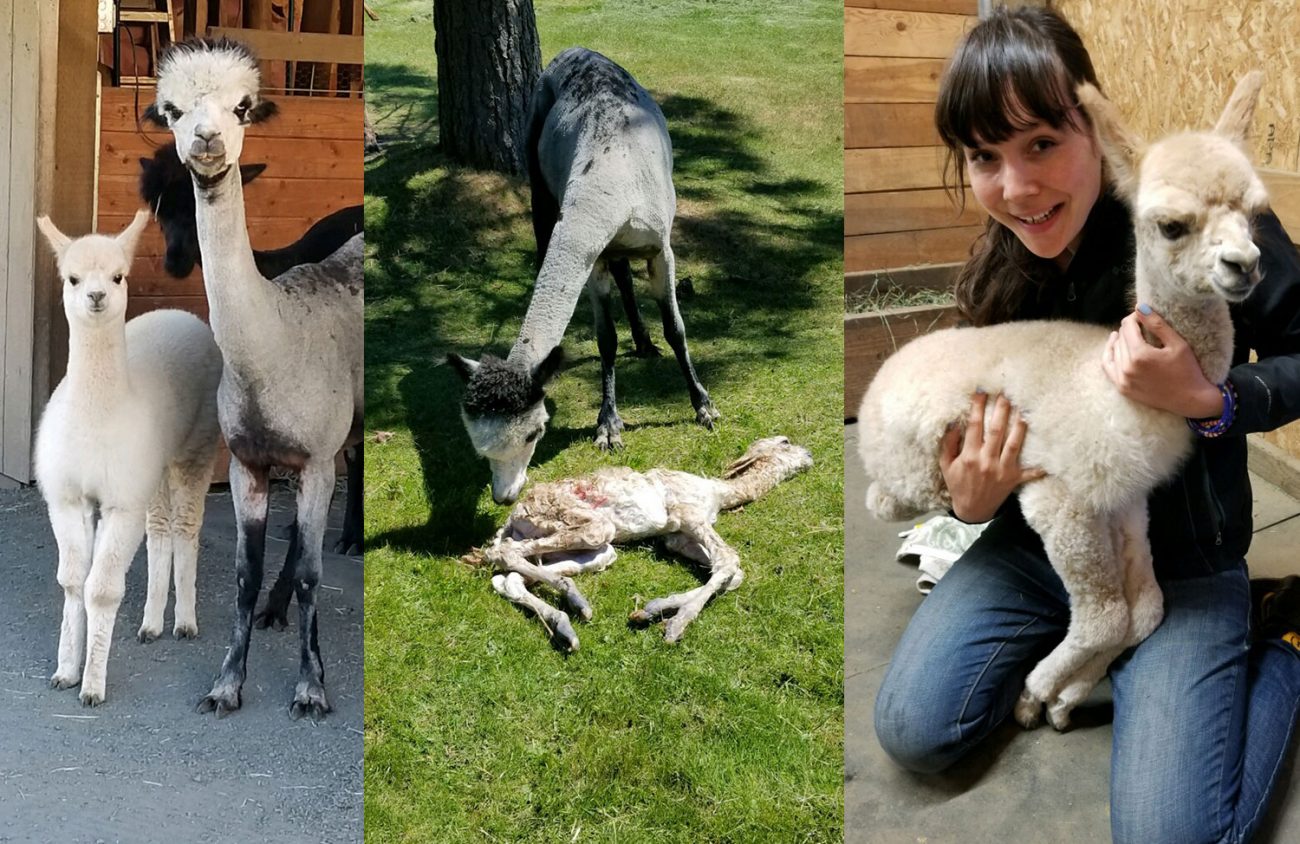The ominous text messages from the alpaca farmhand started around 1:30 pm on June 1.
“Something is up with Shimmer,” read the first text.
I was driving from Spokane to Portland. The second text was a picture of my pet alpaca, Shimmer, lying down in the pasture at Pura Vida Alpaca Farm outside Eugene with her black vagina bulging out, but not open.
“She went off by herself in the pasture. I think this is it,” read the third text.
I’ve been waiting since 2015 for Shimmer to have her baby. Alpacas gestate for 11 to 12 months. They mostly birth single babies. It’s a big deal when they deliver. I spent most of this year thinking she wasn’t pregnant, after she rejected the farm’s stud alpaca by unceremoniously biting a chunk out of his neck when he tried to put the moves on her.
The next text read: “We can see a nose.” This was followed by a picture of Shimmer standing with a bright white baby head and two little legs hanging out of her back end.
By this time, I was on the phone with the farmhand, grilling her with questions.
“The baby just coughed,” she reports to me. “So he’s breathing now, but not out.”
She hangs up and, for 10 tense minutes, no one responds to any of my frantic phone calls. Was it a boy? Is it out? What color is he? Is Shimmer okay?
Finally, Robbin Freedman, the alpaca farmer at Pura Vida, calls me back. It’s a boy, he is a fawn color and he weighs 19 pounds.
All of this was terrific news, except I wasn’t there. I raced the next three hours through I-5 traffic from Portland down to Eugene. I live and work in Eugene and have boarded Shimmer at Pura Vida Alpacas for the past three years.
I arrived at the barn, just outside of town, and saw him for the first time. Apricot honey fuzz rabbit, soft little nose, innocence, doey sweet eyes — a jumble of words ran through my mind. I cried. I picked him up and held him.
He was still shaking and still moist, and his breath smelled like hay. His legs were so long — like a deer fawn has long legs. Shimmer was humming (a sound made by alpacas that expresses anxiety and curiosity) and nibbling his ears.
Everyone in the barn was oddly quiet, though. I asked Freedman if everything was okay. She wouldn’t look at me.
“She hasn’t passed the placenta. Baby isn’t nursing. It’s been six hours,” she said quietly, white lipped.
I grew up on a farm in eastern Washington. I can say I’ve seen more baby farm animals die than live. Infants of any type are so fragile.
Freedman says we should attempt to bottle feed the baby. She is making baby formula for goats that can also go to alpacas. The bottle says “Lifeline,” which makes me feel like we are all about to die, not just the baby.
A good emergency gives anyone a panic attack.
We tip the baby’s head back and give him a bit of formula, which he sucks down. He seems to understand nursing.
Shimmer is a basket case. Not only are we touching her new baby and crowding four people around her, but her vagina is torn, her teats are bursting with unsung milk and she is allegedly still packing a 15-pound sack of fluid and blood somewhere in that belly.
Freedman suggests milking Shimmer might help her expel the placenta. Apparently nursing and passing the placenta go together. Sometimes one encourages the other.
We halter her up and I gingerly massage her extremely tight udder, hoping to relax it enough to bring some milk down. Her four little teats are small — soooo small — like the size of a dog teat. It doesn’t help she is trying to kick me in the face as I pinch her tiny nipples. Several white streams of milk come shooting into the measuring cup we’ve held up to her udder.
We quickly pour the hot milk into the baby bottle and give it to the baby, who drinks this, too. I don’t want to name him, I tell one of the farmhands. I don’t want to get attached.
Another hour passes, and everyone is exhausted. It’s been eight hours of this. Everyone says they are going home, and maybe she’ll pass the placenta during the night. They leave.
I’m left alone with the baby and Shimmer. I’m so afraid he’ll die I set up a tent next to the barn and wake up every half hour to feed him more formula.
About midnight, I come out to check on him. A wet trail is in their stall. I think to myself, “I didn’t spill any water over there?”
I follow the trail out of the barn. Shimmer is standing in the darkness with a four-foot mass of white tissue and blood hanging out of her. It falls to the ground and bursts. The whole bloody placenta has to be 10 pounds of liquid.
I call everyone excitedly to say she is going to be fine. I pick up the placenta with a plastic bag to save it for the vet to examine.
And then I tell everyone I’ve named the baby Rio.
At this writing, Rio is 11 days old. He began nursing the morning after his birth, and now you can’t get him to leave mama alone. His beautiful apricot fiber is growing longer by the day.
